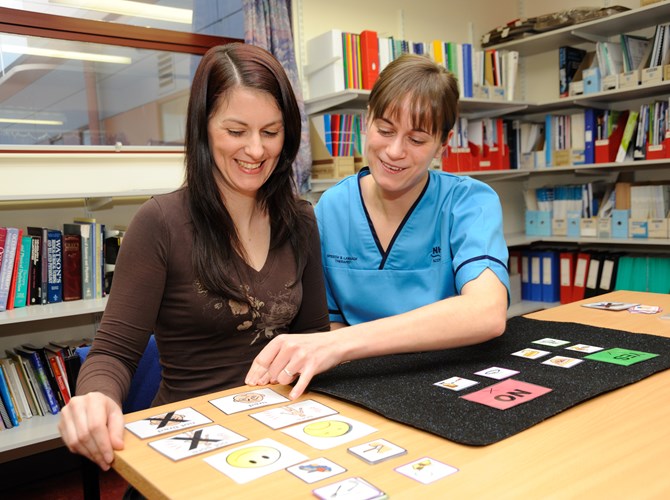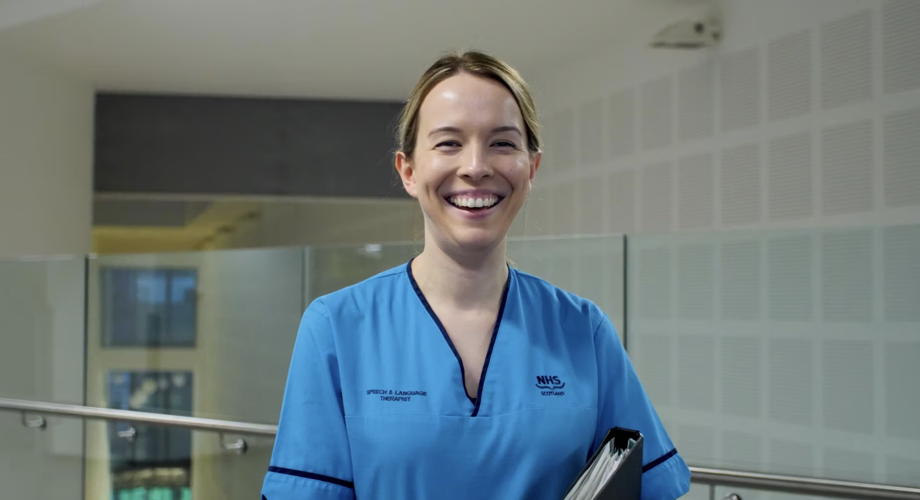Previous
Prosthetist
You must complete a pre-registration degree programme to become a speech and language therapist in the NHS.
Speech and language therapists provide treatment, support, and care for children and adults with communication difficulties or eating, drinking and swallowing problems.

To get on a course that could lead to a career as an speech and language therapist, useful subjects include:
Speak to your guidance teacher about subjects offered at your school.

You may find it helpful to get some healthcare experience by doing a work placement or volunteering. You’ll get training, increase your knowledge, and learn new skills. This could help you when applying to university, college or a new job with NHSScotland.
You'll need a degree to become a speech and language therapist. Most universities accept a wide range of qualifications, giving you the option of applying directly from school or going to college first.
At college, you could do an HNC in Healthcare Practice.
Widening participation supports adult learners who want to go to university. If you’re an adult with few or no qualifications, you could get into higher education through the Scottish Wider Access Programme (SWAP). Many universities also provide access programmes to help you get the degree entry qualifications you need.
Two universities in Scotland offer undergraduate programmes in Speech and Language Therapy or Speech and Language Pathology approved by the HCPC:
Pre-registration undergraduate programmes take 4 years full-time.
If you have relevant qualifications and healthcare experience, you can do a postgraduate diploma or a master’s degree in Speech and Language Therapy. A pre-registration postgraduate course usually takes 2 to 3 years.
You should contact individual universities to find out about specific entry requirements.
After graduation, you must register with the HCPC. You can then apply as a newly qualified speech and language therapist for vacancies in the NHS.
As a speech and language therapist, you would work with people who experience communication or swallowing difficulties for various reasons. These include:
Tasks include:
You'll need these skills:
Speech and language therapists work with other healthcare professionals, including:
You could work in:

Check out our 360 videos and find out how speech and language therapists help people with communication, eating, drinking, and swallowing problems.
You'll meet Claire, an advanced speech and language therapist at NHS Lothian. In these videos, Claire helps a patient use an eye-gaze device, which supports people who are no longer able to use their voice.
In the second 360 video, Claire assesses a patient's communication difficulties and in the last video, she helps the patient improve their swallowing function.
During your career, you’ll be expected to keep your skills and knowledge up to date through Continuing Professional Development. The Royal College of Speech and Language Therapists (RCSLT) provides:
Visit the RSCLT website for more about training and CPD courses.
When you become a qualified speech and language therapist, you must register with the HCPC to work in the NHS. You can also join the Royal College of Speech and Language Therapists.

Discover the range of AHP careers you can choose in the NHS.
Allied health professions
Our blog includes how-to guides, case studies, and career resources.
Discover more